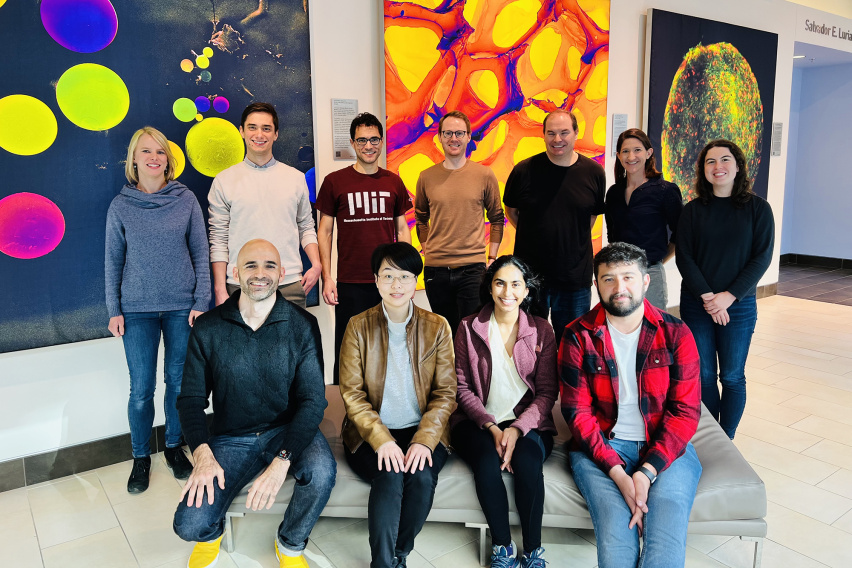
Front row (left to right): Tarek Fadel (founding director), B.J. Kim, Shalmalee Pandit, Gil Covarrubias. Back row (left to right): Sophie Herbst, Andrea Casiraghi, Jacob Witten, Malte Roerden, Keith Eidell, Elizabeth Calle, Susanna Elledge.
MIT Koch Institute
December 6, 2022
The Marble Center for Cancer Nanomedicine and the MIT Center for Precision Cancer Medicine (CPCM) are pleased to announce the 2022-2023 class of Convergence Scholars. Founded in 2017, the Convergence Scholars Program (CSP) is designed to foster the career development of aspiring independent scientists with diverse interests in research, technology, and STEM outreach. Through a series of research or clinical seminars, skill-based workshops, mentoring, interactive social hours, and a supplemental stipend, the CSP aims to broadly expand the professional toolkit available to each scholar from a multi-disciplinary and omnibus career perspective. Moreover, by tailoring individual goals with training opportunities and connections through MIT and its affiliated institutions, the CSP prepares postdocs for a critically important, yet often overlooked component of a scientist—life beyond the bench.
The CSP has already cultivated a rich history of success stories, some of which are highlighted at the Marble Center for Cancer Nanomedicine website. While approximately two-thirds of scholars are now academic faculty in universities across the world—a statistic that reflects the type of personalized growth and investment emphasized by the CSP—scholars have also obtained positions beyond academia, such as in biotech start-ups and federal agencies, by capitalizing on the strong collegial networks between the Koch Institute, the MIT community, and industry and clinical partners around greater Boston. Empowered with knowledge in the clinical, pharmaceutical, financial, regulatory, and educational sectors, CSP scholars represent well-rounded, highly intelligent, and acutely conscientious scientists that make compelling candidates across a wide range of careers.
As wielders of the next CSP torch, please join us in congratulating the Class of 2023 Convergence Scholars:
- Elizabeth (Liz) Calle, Langer Lab: As a physician trained in general surgery, Liz utilizes a variety of biochemical and engineering techniques, including biological polymers and ultrastructural analysis, to investigate how endothelial cell surface chemistry regulates microvascular permeability and interaction with circulating cells, such as neutrophils and platelets.
- Andrea Casiraghi, Koehler Lab: Employing high-throughput drug screening methods and cheminformatics, Andrea evaluates new probe compounds to uncover therapeutic targets and genetic dependencies of gastric cancer and small-cell lung carcinoma, as well as transporters involved in nanoparticle delivery.
- Gil Covarrubias, Hammond Lab: Engineering layer-by-layer nanoparticles as cancer-specific delivery vectors, Gil aims to enhance the local delivery of immunostimulatory cytokines, IL-12 and IL-15sa, for restoring anti-tumor immunity in high-grade serous ovarian cancers.
- Keith Eidell, Hemann Lab: Following a genome-wide screen in leukemia models that identified regulators of cellular immunotherapy response, Keith seeks to elucidate the mechanistic role of the cytoskeleton in resisting emerging treatment paradigms for leukemia, such as CAR-T-based therapy, and how to re-sensitize cancer cells to these modalities.
- Susanna Elledge, Bhatia Lab: Across multiple stages of ovarian cancer, Susanna develops diagnostic probes for early detection and harnesses proteases expressed within the tumor microenvironment for enhanced targeted therapies in late-stage metastatic cancer.
- Sophie Herbst, White Lab: Integrating clinical data with phosphoproteomics on patient tumor samples, Sophie seeks to understand broad signaling changes and predict new and effective therapeutic targets from computational approaches, such as machine-learning.
- B.J. Kim, Irvine Lab: Relying on her training in materials science and immunoengineering, B.J. synthesizes lipid nanoparticle, RNA-based vaccines for cancer and HIV applications while subsequently studying their effects on the innate immune.
- Shalmalee Pandit, Belcher Lab: To productively detoxify environmental waste and reduce atmospheric temperature, Shalmalee creates yeast-based systems that can couple cadmium recycling with fermentation or sequester carbon dioxide, respectively.
- Malte Roerden, Spranger Lab: As a physician trained in hematology and oncology, Malte characterizes key determinants of cancer immunotherapy response with hopes of applying new therapeutic insights into the clinic.
- Jacob Witten, Anderson Lab: Merging artificial intelligence with biochemical techniques, Jacob designs lipid nanoparticle for RNA delivery in multiple diseases, including cancer, infections, and genetic disorders.